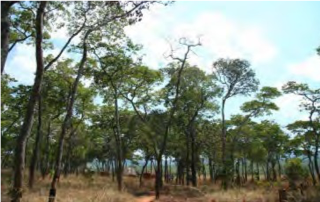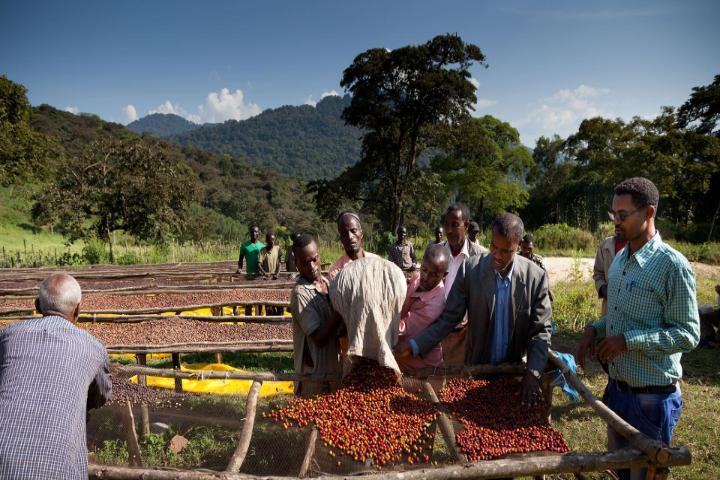
International Research Partners
We have links with many leading universities and independent business schools across the world, through co-authoring publications with overseas collaborators, reciprocal visiting professorships and fellowships, joint supervision of research students and joint grant bids.
International Impact Case Studies from REF2021

Developing a Global Capability Framework
The Global Capability Framework represents a seismic shift in the way that public relations as a profession will be understood in the future, and the ways that professionals work and develop. Its impact has reach around the world and its significance is enormous.

Sustainable Management of Wetlands
Adrian Wood and his research team have been working with communities and organisations in Eastern and Southern Africa developing sustainable management techniques for seasonal wetlands since the mid 1990s.

Strengthening Sustainable Urban Mobility
Dr Nikitas research has inspired authorities in Drama, Greece, to prioritise bicycling and the creation of the first ever local bike-sharing scheme (BSS) and design and implement the first Walking School Buses (WSBs) in Greece.

Maintaining the Forests of South West Ethiopia
Adrian Wood and his research colleagues have worked with a range of local actors to use their action research to develop and implement an approach to sustainably and effectively manage parts of the remaining but extensive forest landscapes of Ethiopia.

Globalising Kosher and Halal Food Markets
Global markets for Halal and Kosher meat continue to expand, leading not only to opportunities for business, but to controversy, confusion and anxiety over cultural and religious difference.
Developing a Global Capability Framework for the Public Relations Profession
Authors: Professor Anne Gregory, Dr Gabriel Sadi

Anne was engaged by the Global Alliance for Public Relations and Communications Management to lead a large-scale international research project exploring the roles, knowledge, skills and dispositions that make up the capabilities required to be an effective public relations professional. In a time when the profession is in a state of change due to increasing globalisation, as well as increasingly complex national, regional and international contexts, a means through which professionals could understand their own practice, that of their colleagues or employees, and identify areas where training and development is timely and crucial. The original research took place in nine countries over six continents and has since been replicated in other nations around the world.
What emerged from the research was a Framework based on a small, common set of capabilities agreed upon by researchers and professionals around the world. Rather than being a set of 'competencies', by which professionals might measure their 'performance' as if it were a list of tasks to complete, capabilities are about attributes and skills. This means that there is considerable flexibility within the framework in terms of how different professionals might make use of it – different sectors and industries may value different attributes more or less highly. It also allows for geographical and cultural difference to be accounted for, as the flexibility of the framework allows for different parts to have more or less importance depending on the context.
It is this flexibility that has been instrumental in the scale of the success of the Framework. It has been adopted around the world in various forms and used in a range of ways. Many national professional associations have put it at the centre of their Professional Development offering and are using it as the benchmark by which training is measured going forward. Additionally, large companies are using the framework as a means through which to provide training and development across their public relations workforce, who may occupy diverse locations, with equally diverse needs. The framework is also being absorbed into education as some providers begin to use the framework to structure their public relations courses. This means that those graduates will be equipped with the capabilities outlined in the framework, and as it adopted in more locations around the world, they will be ideally placed to work successfully in those ranges of different settings.
The Global Capability Framework represents a seismic shift in the way that public relations as a profession will be understood in the future, and the ways that professionals work and develop. Its impact has reach around the world and its significance is enormous.
Helpful websites:
Global Alliance for Public Relations and Communications Management
Public Relations Institute of New Zealand
Professional Council of Public Relations of the Argentine Republic
Sustainable Management of Wetlands in East and Central Africa: Enhancing Livelihoods, Stimulating Enterprise, and Building Resilience in the Face Of Climate Change
Case study authors: Professor Adrian Wood, Matt Snell
Research team: Professor Gerard McElwee

Adrian Wood and his research team have been working with communities and organisations in Eastern and Southern Africa developing sustainable management techniques for seasonal wetlands since the mid 1990s. This work builds on ongoing relationships with NGOs, governments and other actors across the continent. Adrian and his colleagues conducted research in three countries (Ethiopia, Malawi and Zambia), looking at how these wetlands might be used to improve food security and strengthen livelihoods whilst maintaining the resources.
From the research emerged an approach to wetland cultivation and management known as the Functional Landscape Approach. This marries local communities' existing knowledge of farming the wetlands, with new practical innovations to support their sustainable use and conservation. This approach has also helped identify formerly damaging practices, has replaced these with sustainable alternatives, and has introduced institutional arrangements to support the initiatives.
The impact of the implementation of the approach is huge. For the communities who are now able to make use of this land for farming, they can grow a more diverse range of crops which has the dual benefit of increasing food security during dry seasons and addressing harvest failures due to climate change. The increased diversity of food crops means that families have access to more nutritional food which has considerably reduced stunting in children, and improved the health outcomes of people living with HIV/AIDS.
Practical innovations in the sustainable use and conservation of the wetlands have helped farmers to produce commercially valuable crops out of season. Sale of these has created enough additional income to warrant the formation of small-scale enterprises and cooperatives. The increased income from the produce sold provides capital which families use in diversifying their livelihoods with further farming activities, including keeping livestock, and the development of trading enterprises.
The work has also led to policy impacts resulting in governments shifting their views on the use of wetlands, moving towards recognising that sustainable multiple use is possible. These seasonal wetlands are now seen as potentially important sources of products and capital for farmers, and the Functional Landscape Approach as a means through which to enable this while also conserving the wetlands in the face of climate change. Working in partnership with an international NGO, Self Help Africa, the FLA methods developed by Adrian and colleagues are now being rolled out in a position paper to guide that organisation's work in six countries. The impacts of this will be worth monitoring for REF 2028 given their potentially considerable contribution to the UN's Decade of Ecosystem Restoration (2022-2031) which takes a multi-functional landscape approach.
Helpful websites:
Environmental sustainability and natural resource management - University of Huddersfield
Sustainable and Resilient Communities - Wetlands and Forest Projects
Inspiring and Strengthening Sustainable Urban Mobility in Greece and Beyond
Author: Dr Alexandros Nikitas

In a world realising that planning for sustainable futures is the only pathway for having any future at all, research that inspires and strengthens clean transport policy-making and uptake, especially in a country like Greece that is traditionally a late innovation adopter, is timely and meaningful.
Dr Nikitas research has inspired authorities in Drama, Greece, to prioritise bicycling and the creation of the first ever local bike-sharing scheme (BSS) and design and implement the first Walking School Buses (WSBs) in Greece in a form that is unique globally and involves interinstitutional collaborations.
Drama's European Commission funded Sustainable Urban Mobility Plan (SUMP), cites Nikitas' research as evidence for investing in active transportation initiatives. Twelve of the most forward-thinking Greek cities including Piraeus, Heraklion, Rethymno and Greece's capital city of Athens, one of the most iconic cities in the world, are using the same evidence and Dr Nikitas' expert help for building up their SUMPs. He specifically has consulted on and reviewed theses plans, his research feeding directly into their development, and into local and national transport policy. Strategies to reshape existing bike sharing schemes, and to implement new ones across these regions are already underway, and Walking School Buses look set to take off across the country.
The Hellenic Ministry of Environment and Energy (HMEE) has actually adopted this research as a policy guidance tool, suggesting that the initiatives ignited by it, in Drama and beyond, are best practice examples and actively works to replicate these in every Greek city. HMEE actually claims Dr Nikitas' impact is so critical that name him as a co-creator of their sustainable mobility policy-making, strategy building and implementation agendas recognising the potential of his work to be inspiring and transferable to other countries too.
All in all, Dr Nikitas research has contributed significantly to:
- raising key stakeholders and citizens' awareness about the importance of active transportation and sustainable mobility,
- creating real change by providing guidance to the decision-makers on how to introduce and sustain BSS and WSB schemes that would otherwise be left out of policy and planning agendas,
- supporting the creation of a new sustainable mobility ethos for cities and for the children,
- generating a local liveability impact in Drama, Greece and beyond by helping regulators to reduce traffic congestion, environmental degradation, noise nuisance, energy over-consumption and health-related problems and battle transport-related social exclusion,
- making Drama a best practice example for sustainable mobility intervention for the whole Greece.
These impacts become even more significant now, in the midst and aftermath of the global COVID-19 pandemic, since active transportation could play a new far superior role for cities and societies in this new social distancing era we are entering.
The impact of this research will be felt across the country and will be felt for some time to come.
Further information:
Maintaining the Forests of South West Ethiopia - Community Forest Management and Enterprise Development - Supporting Ethiopia's Climate Resistant Green Economy
Authors: Professor Adrian Wood, Matt Snell

Ethiopia has lost 75% of its forest landscape due to deforestation, and the remaining areas are under threat from agricultural expansion, and degradation through lack of sustainable management. Over the past 15 years, Adrian Wood and his research colleagues have worked with a range of local actors to use their action research to develop and implement an approach to sustainably and effectively manage parts of the remaining but extensive forest landscapes of Ethiopia. The research has helped to conserve and improve the previously degrading forest, as well as enabling the development of forest enterprises and marketing co-operatives. This has helped the 30,000 people in village communities who are involved with forest management to improve their livelihoods and wellbeing, while the forest products benefit many more people. A total of 450,000 hectares of forest across south-west Ethiopia (45% of the country's remaining high forest) is now being managed through the approach developed in this action research, this being an area roughly equivalent to Greater London.
The Participatory Forest Management (PFM) arrangements, which this work has developed and applied, devolve power and responsibility for caring for the forests into the hands of local community organisations. These Forest Management Groups are trained in methods to monitor and sustainably use the forest, and are supported in developing enterprises which enable them to derive profit from collecting and selling a range of non-timber forest products. Furthermore, they are supported in the acquisition of communal land rights, providing them with increased security of tenure. These improvements in livelihoods and rights incentivise these groups to continue to care for the forest. The groups also prevent encroachers entering the managed forest, which has resulted in a dramatic decrease in illegal deforestation in the PFM areas.
Non-timber forest products that have been crucial for the economic success of the PFM schemes include organic honey, jam produced from forest fruits, seeds used in cosmetic products, and genetically unique wild coffee. The formation of marketing co-operatives has enabled those producing forest products to access traders in Addis-Ababa, which has in turn led to sales in the European Fair Trade market. The members of the co-operatives are able to invest in producing better quality products in larger volumes, which can fetch a higher price, and have been supplied to businesses including The Body Shop.
The PFM approach to forest management is regarded as the preferred method through which to conserve forests and improve livelihoods. Policy introduced nationally in 2017 has meant that this approach is considered the norm for managing the remaining forests of Ethiopia and will impact 25 million people who benefit from these areas. It also contributes directly to the country's Climate Resilient Green Economy – a strategy aimed at helping Ethiopia achieve middle income status in an environmentally sustainable manner by 2025.
HBS research on forest management in Ethiopia is providing invaluable support for communities who live in and around these forests, improving their livelihoods and by extension their outcomes, as well as providing vital conservation and protection for the beautiful and essential tropical rainforests of the country.
Having helped to establish nascent value chains for a small range of forest products, the challenge in the run up to REF2028 is for UoH to facilitate work by communities to develop these into reliable sources of income and to further explore the food and pharmaceutical potential of the rich biodiversity found in Ethiopia's rainforests.
Helpful websites:
Environmental sustainability and natural resource management - University of Huddersfield
Sustainable and Resilient Communities - Wetlands and Forest Projects
Globalising Kosher and Halal Food Markets: Social Consequences and Economic Opportunities
Author: Dr John Lever

Global markets for Halal and Kosher meat continue to expand, leading not only to opportunities for business, but to controversy, confusion and anxiety over cultural and religious difference. The differences in the way meat is slaughtered and handled, and the way it is labelled, has created confusion and anxiety in the media and among consumers of all backgrounds.
Most halal meat in the UK comes from stunned animals, but in recent decades a smaller market has emerged for non-stunned meat. As both markets have expanded, producers and certification in the market for stunned halal meat have made their products harder to identify to avoid reputational pressures, thus increasing (rather than avoiding) social and political tension. This presents problems for retailers, who want to increase the purchase and consumption of kosher and halal meat
John has a longstanding relationship with the British Veterinary Association (BVA), having been invited to speak at events, contribute to blogs, and provide input on their activities. He advised, following analysis of the impact of the same measures in Denmark, that the BVA should stop campaigning to outlaw non-stun slaughter in the UK. The Danish experience demonstrated that, once the difference stunned halal meat and non-stunned halal was highlighted, and the choice removed, demand for non-stunned meat among Muslim consumers increased significantly. The BVA took on board this advice and developed a new working group (where John is an invited expert) to enhance market transparency.
In addition, John has worked with the national supermarket chain Morrisons to develop formal guidance for potential suppliers to ensure that they are compliant with their Halal standards. This enables the supermarket to confidently market halal meat, providing information to reassure customers about its origins and methods of slaughter. John is also working with halal certification bodies and other stakeholders on a new labelling system for halal meat with the Department for Environment, Food and Rural Affairs (Defra), which also seeks to address the controversies created by the lack of market transparency.
Further information:
BVA Blog: Debating Religious Slaughter
LSE Blog: Religious Animal Slaughter
Food Politics: Weekend Reading
Helpful websites: